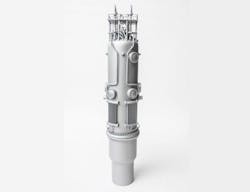NRC gives final certification approval for NuScale Power small Nuclear Reactor design in U.S.
The future of small, advanced nuclear reactor may be reached a huge milestone Friday.
After years of review, the U.S. Nuclear Regulatory Commission has directed NRC staff to issue a final rule certifying applicant NuScale Power’s small modular reactor design for use in the country’s power generation mix. The certification means that NuScale’s SMR design is considered to meet the agency’s safety requirements.
Oregon-based NuScale Power has been seeking U.S. nuclear regulatory approval for seven years and is the latest SMR developer to gain that inroad to certification in North America. Many proponents of a lower carbon power generation mix have said that achieving the carbon-free goal and retaining grid resiliency may be impossible without more nuclear energy, which does not emit carbon dioxide.
“The design uses natural, “passive” processes such as convection and gravity in its operating systems and safety features, while producing up to approximately 600 MW of electricity,” today’s NRC announcement reads. “The SMR’s 12 modules, each producing 50 MW, are all submerged in a safety-related pool built below ground level.”
The NRC has previously certified six other designs: the Advanced Boiling Water Reactor, System 80+, AP600, AP1000, the Economic Simplified Boiling Water Reactor and the APR1400.
Some experts commend nuclear for its carbon-free, on-site fuel supply attributes and its dispatchable generation to complement intermittent renewables. They also note that its costs may have relatively small compared to conventional nuclear projects such as the estimated $30 billion Vogtle Units 3 and 4 epxansion undertaken by Southern Co. in Georgia.
Industries seeking energy resiliency and sustainability, such as data centers, have theorized about the potential of SMR nuclear for carbon-free microgrids.
The NRC certification will become effective 30 days after the rule is published in the Federal Register.
Through the past few years, NuScale Power has announced collaborations with various companies around the world. Those agreements have included the Dairyland Power Cooperative in the U.S. and copper producer KGHM Polska Miedz in Poland, among others.
Technology and equipment firms such as Doosan, Samsung and GS Energy are engaged in collaborations with NuScale Power.
-- -- --
(Rod Walton, senior editor for EnergyTech, is a 14-year veteran of covering the energy industry both as a newspaper and trade journalist. He can be reached at [email protected]).
About the Author
Rod Walton, EnergyTech Managing Editor
Managing Editor
For EnergyTech editorial inquiries, please contact Managing Editor Rod Walton at [email protected].
Rod Walton has spent 17 years covering the energy industry as a newspaper and trade journalist. He formerly was energy writer and business editor at the Tulsa World. Later, he spent six years covering the electricity power sector for Pennwell and Clarion Events. He joined Endeavor and EnergyTech in November 2021.
Walton earned his Bachelors degree in journalism from the University of Oklahoma. His career stops include the Moore American, Bartlesville Examiner-Enterprise, Wagoner Tribune and Tulsa World.
EnergyTech is focused on the mission critical and large-scale energy users and their sustainability and resiliency goals. These include the commercial and industrial sectors, as well as the military, universities, data centers and microgrids. The C&I sectors together account for close to 30 percent of greenhouse gas emissions in the U.S.
He was named Managing Editor for Microgrid Knowledge and EnergyTech starting July 1, 2023
Many large-scale energy users such as Fortune 500 companies, and mission-critical users such as military bases, universities, healthcare facilities, public safety and data centers, shifting their energy priorities to reach net-zero carbon goals within the coming decades. These include plans for renewable energy power purchase agreements, but also on-site resiliency projects such as microgrids, combined heat and power, rooftop solar, energy storage, digitalization and building efficiency upgrades.

